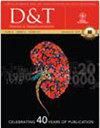The survival benefit of renal transplantation is well established. As the average life expectancy increases, so too will the average age of renal transplant patients.
We reviewed our experience with renal transplantation in patients 70 years of age and older. Fifty patients aged 70 years and older were transplanted at our institution between 1997 and 2007. Demographics and outcomes were recorded retrospectively.
The mean age of the cohort was 73.1 years (range, 70–80 years). Among the 50 transplanted allografts, 32 (64%) were from deceased donors, and 18 (36%) were from living donors. At last follow-up, 45 (90%) patients were alive and 43 (86%) grafts were functioning. Median survival was 6.42 years. Five patients (10%) died, three from sepsis, one from cytomegalovirus infection, and one from myocardial infarction and stroke. There was no difference in the frequency of diabetes or hypertension compared with younger recipients in our institution during the same time period. Mean serum creatinine levels at 3 months, 6 months, 1 year, 2 years, and 3 years of fol-low-up were, respectively, 1.8 ± 0.97 (n = 41), 1.8 ± 1.3 (n = 33), 1.5 ± 0.4 (n = 25), 1.6 ± 0.45 (n = 16), and 1.5 ± 0.37 (n = 6) mg/dL. There were no statistically significant differences in acute cellular rejection between dif-ferent induction regimens. There were two grafts lost to rejection and fewer infections in the interleukin-2 receptor blocker group compared with the thymoglobulin group (p = NS).
Renal transplantation in patients 70 years of age and older is associated with excellent patient and graft survival, similar to rates in younger recipients. Advanced age should not be a contraindication to renal transplantation.


